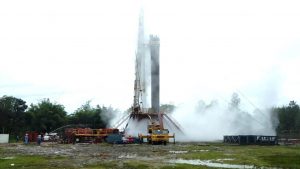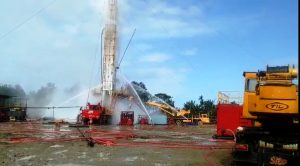Even as the COVID-19 pandemic continues to soar in India, the country’s northeastern state of Assam is faced with the challenge of plugging a leak at a gas well that has already caused substantial damage.
The blowout at Baghjan in eastern Assam occurred on May 27, when a producing well started releasing natural gas in an uncontrolled manner.
But more than a week after the blowout, gas continues to pour out “uncontrollably,” prompting the state owned agency to seek assistance from a Singapore-based firm to plug the leak. Three experts who landed at the site on Monday have begun the operation to stop the blowout.
Around 2,500 people have been evacuated from neighboring villages of the affected well and they have been lodged in three relief camps.
A statement issued by the state-owned Oil India Limited (OIL) said that the “workover operations” were conducted out under its supervision by a rig owned by John Energy Private Limited. OIL has issued a cause-notice to the firm even as speculation is rife that it flouted certain norms during the operation.
The Baghjan Oilfield is located in an area of rich biodiversity and is sandwiched between the Maguri Beel wetlands and the Dibru Saikhowa National Park. It is estimated that more than 30 species of mammals and nearly 400 species of birds are indigenous to the area, while the wetlands are a haven for migratory birds that flock to the region.
So far, the carcass of a river dolphin was recovered from the Maguri Beel, close to the explosion, in addition to many endangered birds and fish that were found dead. A sticky deposit of oil has also been discernible on the leaves of the trees near the affected spot. There are reports suggesting that the rivers flowing into the wetlands have become contaminated from the explosion.
Local residents have complained of headaches, burning eyes, and respiratory problems after the blowout. Residents from the affected villages have organized protests seeking compensation and the protection of the biodiversity of the area.
At Baghjan, mitigation efforts are underway, with the spraying of cold water at the site of the disaster to prevent an explosion that could worsen the situation. The incident is the latest in a series of leakages and fires at spots where operations are conducted either by state owned agencies or firms that bag contracts from these agencies.
This is the second blowout since 2005, when one took place at Dikom in neighboring Dibrugarh. Fire-fighting experts were brought from other countries to control the blaze. The operation was successful only after 45 days, when much damage had already been caused to the environment.
Rajeev Bhattacharyya is a senior journalist based in Assam, India.










































